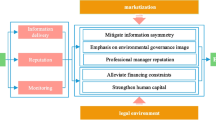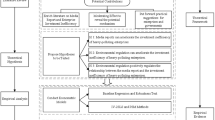Abstract
In recent years, the frequent occurrence of smog in Chinese cities has prompted great changes in the policy environment faced by enterprises. In this study, we address the question whether the decision-making behavior of enterprises will be affected by smog. This paper studied the 2010–2018 data of 218 listed Chinese polluting companies to investigate the impact of smog on corporate social responsibility (CSR). The subjects of this study were all listed on China’s A-share market on either the Shenzhen or Shanghai Stock Exchange. The empirical results indicate the following: (1) the more serious the smog, the more likely enterprises are to perform CSR; (2) smog exerts a higher impact on the social responsibility of enterprises that receive more media attention. Further research determined that media attention, whether positive, negative, or neutral, plays the same role in moderating the relationship between smog and CSR; and (3) compared to private enterprises, the function of smog in promoting the CSR fulfillment of state-owned enterprises (SOEs) is more obvious. Based on the reality of Chinese polluting industries, this research combined smog and media attention in the exploration of CSR, which not only enriches CSR research but also provides positive guidance for the sustainable development of polluting enterprises.

Similar content being viewed by others
Data availability
All data generated or analyzed during this study are included in this published article.
References
Boustan LP, Kahn ME, Rhode PW (2012) Coping with economic and environmental shocks: institutions and outcomes: moving to higher ground: migration response to natural disasters in the early twentieth century. Am Econ Rev 102:238–244. https://doi.org/10.1257/aer.102.3.238
Brickson SL (2007) Organizational identity orientation: the genesis of the role of the firm and distinct forms of social value. Acad Manag Rev 32:864–888. https://doi.org/10.5465/amr.2007.25275679
Campbell JL (2007) Why would corporations behave in socially responsible ways? An institutional theory of corporate social responsibility. Acad Manag Rev 32:946–967. https://doi.org/10.5465/amr.2007.25275684
Chang TY, Huang W, Wang YX (2018) Something in the air: pollution and the demand for health insurance. Rev Econ Stud 85:1609–1634. https://doi.org/10.1093/restud/rdy016
Chen CW, Pantzalis C, Park JC (2013) Press coverage and stock price deviation from fundamental value. J Financ Res 36:175–214. https://doi.org/10.1111/j.1475-6803.2013.12007.x
Chen LH, Zhang LP, Ye Y (2015) Property rights, audit quality, product type and charitable donations——based on strategic philanthropy. Aud Res 5:68–75
Chu SC, Chen HT, Gan C (2020) Consumers’ engagement with corporate social responsibility (CSR) communication in social media: evidence from China and the United States. J Bus Res 110:260–271. https://doi.org/10.1016/j.jbusres.2020.01.036
Dominici F, Peng RD, Bell ML, Pham L, McDermott A, Zeger SL, Samet JM (2006) Fine particulate air pollution and hospital admission for cardiovascular and respiratory diseases. JAMA 295:1127–1134. https://doi.org/10.1001/jama.295.10.1127
Espinoza MJP, Carrion CE, Mocha BP (2016) Corporate social responsibility and environmental approach:a sustainable vision to the future. Rev Univ Y Soc 8:169–178
Fischer PH, Marra M, Ameling CB, Hoek G, Beelen R, de Hoogh K, Breugelmans O, Kruize H, Janssen NA, Houthuijs D (2015) Air pollution and mortality in seven million adults: the Dutch environmental longitudinal study (duels). Environ Health Perspect 123:697–704. https://doi.org/10.1289/ehp.1408254
Friedman M (2007) The social responsibility of business is to increase its profits. Springer. https://doi.org/10.1007/978-3-540-70818-6_14
Gardberg NA, Fombrun CJ (2006) Corporate citizenship: creating intangible assets across institutional environments. Acad Manag Rev 31:329–346. https://doi.org/10.5465/amr.2006.20208684
Garriga E, Melé D (2004) Corporate social responsibility theories: mapping the territory. J Bus Eth 53:51–71. https://doi.org/10.1023/B:BUSI.0000039399.90587.34
Gu ZH (2015) Corporate governance and corporate philanthropy: empirical study from Chinese A-share listed companies. Manag Rev 27:69–84
Ikram M, Sroufe R, Mohsin M et al (2019a) Does CSR influence firm performance? A longitudinal study of SME sectors of Pakistan. Journal of Global Responsibility 11:27–53. https://doi.org/10.1108/JGR-12-2018-0088
Ikram M, Zhou P, Shah SAA, Liu GQ (2019b) Do environmental management systems help improve corporate sustainable development? Evidence from manufacturing companies in Pakistan. J Clean Prod 226:628–641. https://doi.org/10.1016/j.jclepro.2019.03.265
Ikram M, Zhang Q, Sroufe R, Ferasso M (2020) The social dimensions of corporate sustainability: an integrative framework including COVID-19 insights. Sustainability 12(20):8747. https://doi.org/10.3390/su12208747
Jia XP, Liu Y (2014) External environment, internal resources and corporate social responsibility. Nankai Manag Rev 17:13–18
Ju S, Chung MS (2015) Evaluation of corporate social responsibility activities for fashion company’s sustainable management: on the moderating effects of consumers’ perceived fit and motivation. Res J Costumec 23:644–660. https://doi.org/10.7741/rjcc.2015.23.4.644
Kesavan R, Bernacchi MD, Mascarenhas Oswald AJ (2013) Word of mouse: CSR communication and the social media. Int Manag Rev 9:58–66
Koehn D, Ueng J (2010) Is philanthropy being used by corporate wrongdoers to buy good will? J Manag Gov 14:1–16. https://doi.org/10.1007/s10997-009-9087-8
Lee HM, Van Dolen W, Kolk A (2013) On the role of social media in the ‘responsible’ food business: blogger buzz on health and obesity issues. J Bus Eth 118:695–707. https://doi.org/10.1007/s10551-013-1955-0
Li B, Peng MZ, Zeng YT (2018) Air pollution, state ownership and firm value loss. Ekoloji 27:1167–1174
Li B, Guo PX, Zeng YT (2019) The impact of haze on the availability of company debt financing: evidence for sustainability of Chinese listed companies. Sustainability 11:806. https://doi.org/10.3390/su11030806
Liu YG, Liu MN (2015) Have smog affected earnings management of heavy-polluting enterprises?——based on the political-cost hypothesis. Acc Res 3:26–33
Liu CJ, Zhu ML (2018) Who influences whom: property right, corporate social responsibility spillover and performance. Bus Manag J 40:105–122
Lu JG, Lee JJ, Gino F, Galinsky AD (2018) Polluted morality: air pollution predicts criminal activity and unethical behavior. Psychol Sci 2:114–143
Luo KY, Tian QB (2019a) Research on charitable donation behavior of polluting enterprises under smog pollution. Mod Econ Res 5:88–98
Luo KY, Tian QB (2019b) Does haze pollution curb business investment expenditure --experimental evidence from pollution listed companies. J Shanxi University of Finance & Economics:26–40
Myers D (1987) Internal monitoring of quality of life for economic development. Econ Dev Q 1:268–278. https://doi.org/10.1177/089124248700100309
Peng WB, Wen ZY (2019) Does haze pollution affect household consumption? -- evidence of urban space panel data. Con Econ 35:62–71
Porter ME, Kramer MR (2006) Strategy and society:the link between competitive advantage and corporate social responsibility. Harv Bus Rev 84:78–92
Qi B, Yang R, Tian G (2014) Can media deter management from manipulating earnings? Evidence from China. Rev Quant Fin Acc 42:571–597. https://doi.org/10.1007/s11156-013-0353-0
Shao S, Li X, Cao JH (2016) China’s economic policy choices for governing smog pollution based on spatial spillover effects Yang II. Econ Res J 51:73–88
Shen YJ, Yu L, Jiang DQ (2019) Does the improvement of air quality decrease firm labor cost? Manag World 35:161–178
Sheng MQ, Wang S, Zhang CQ (2017) Smog and corporate financing: empirical evidence from heavily polluting listed industries. Econ Rev 5:28–39
Shiu YM, Yang SI (2017) Does engagement in corporate social responsibility provide strategic insurance like effects? Strat Mgmt J 38:455–470. https://doi.org/10.1002/smj.2494
Tong J, Liu W, Xue J (2016) Environmental regulation, factor input structure and industrial transformation. Econ Res J 51:43–57
Van Donkelaar A, Martin RV, Brauer M, Boys BL (2015) Use of satellite observations for long-term exposure assessment of global concentrations of fine particulate matter. Environ Health Perspect 123:135–143. https://doi.org/10.1289/ehp.1408646
Wan P, Chen X, Ke Y (2020) Does corporate integrity culture matter to corporate social responsibility? Evidence from China. J Clean Prod 120877:120877. https://doi.org/10.1016/j.jclepro.2020.120877
Wang Y, Xu XH (2018) Media coverage, institutional environment and corporate social responsibility fulfillment. Res Financ Econ Issues 12:129–136
Wang CC, Cai J, Chen RJ, Shi J, Yang C, Li H, Lin Z, Meng X, Liu C, Niu Y, Xia Y, Zhao Z, Li W, Kan H (2017a) Personal exposure to fine particulate matter, lung function and serum club cell secretory protein (Clara). Environ Pollut 225:450–455. https://doi.org/10.1016/j.envpol.2017.02.068
Wang Y, Li YX, Ma Z, Song JB (2017b) Media attention, environmental regulation and corporate environmental protection investment. Nankai Managrev 20:83–94
Wei XH, Dong ZQ, Jin Z (2015) Does labor union improve Enterprise employment term structure? -- experimental evidence from sampling survey of private enterprises in China. Manag World 05:52–62
Wu DJ (2016) Corporate governance, media attention and corporate social responsibility. J Zhongnan University of Finance and Economics:110–117
Xu NX, Li Z (2016) CEOs’ poverty experience and corporate philanthropy. Econ Res J 51:133–146
Zeng JG, Zhang Y, Yang X (2016) Religious belief and personal social responsibility tone of executives – from the perspective of individual donation behavior of executives in private enterprises in China. Manag World 4:97–110
Zhang SL, Li Y (2016) Different government smog governance strategies in response to public opinion. Comp Econ Soc Syst 3:52–60
Zhang C, Fu LH, Zheng BH (2018) Motives of charity donation of listed companies: altruism or egoism:based on the experience evidence of earnings management of China's listed companies. Econ Audit Study 33:69–80
Zhang YK, Liu SX, Zeng YT, Li B (2019) Smog pollution, business performance and corporate environmental social responsibility. Chinese Journal of Environmental Management 11(4):39–45
Zhao B, Wu F, Zhang Y (2015) On the visibility, social responsibility and financial performance of companies. J Xiamen Univ Arts Soc Sci 3:20–28
Zhou GC, Zhang L, Zhang LM (2019) Corporate social responsibility, the atmospheric environment, and technological innovation investment. Sustainability 11:481. https://doi.org/10.3390/su11020481
Acknowledgments
We thank East China University of Technology for providing a platform and support for writing the paper.
Funding
This research was financially supported by the Humanities and Social Sciences Research Project of Jiangxi Universities (Project No: JD17002, JD17004) and The Young Marxist Theoretical Research and Innovation Project Funding Project of Jiangxi Province (Project No:20QM99).
Author information
Authors and Affiliations
Contributions
Xiong Guobao is the main designer of the article, mainly responsible for the overall arrangement of the article, and assumes the main responsibility for the article. Luo Yuanda is an important participant in the paper and participated in the writing of the article. All authors read and approved the final manuscript.
Corresponding author
Ethics declarations
Competing interests
The authors declare no competing interests.
Ethical approval
All analyses were based on previous published studies, thus no ethical approval consent are required.
Consent to participate
Not applicable.
Consent to publish
Not applicable.
Additional information
Responsible Editor: Eyup Dogan
Publisher’s note
Springer Nature remains neutral with regard to jurisdictional claims in published maps and institutional affiliations.
Rights and permissions
About this article
Cite this article
Xiong, G., Luo, Y. Smog, media attention, and corporate social responsibility—empirical evidence from Chinese polluting listed companies. Environ Sci Pollut Res 28, 46116–46129 (2021). https://doi.org/10.1007/s11356-020-11978-4
Received:
Accepted:
Published:
Issue Date:
DOI: https://doi.org/10.1007/s11356-020-11978-4




